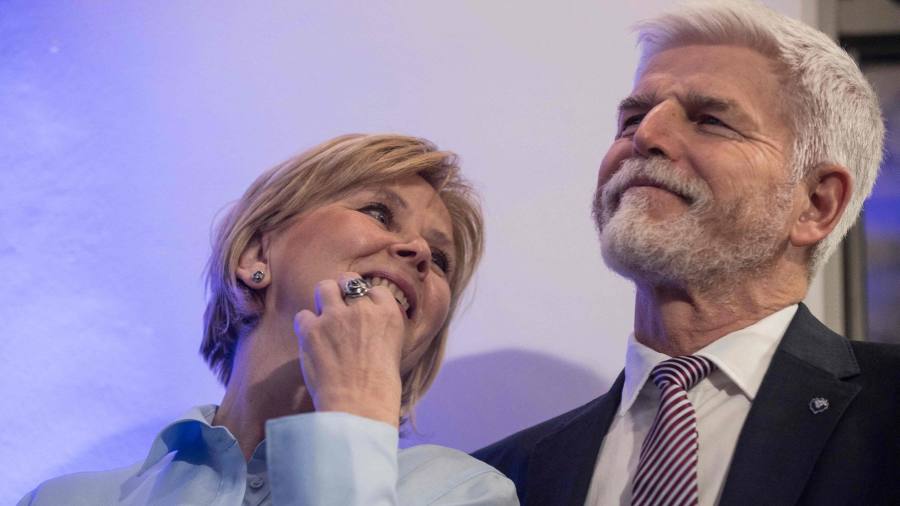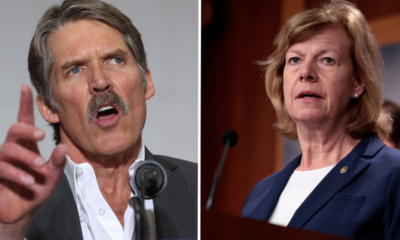A man holds up a Palestinian flag as activists and students surround piled barricades at an encampment at at George Washington University early Monday.
Kent Nishimura/Getty Images
hide caption
toggle caption
Kent Nishimura/Getty Images
A man holds up a Palestinian flag as activists and students surround piled barricades at an encampment at at George Washington University early Monday.
Kent Nishimura/Getty Images
Pro-Palestinian demonstrators continue to turn out at schools across the country despite the risk of detention and suspension, with nearly 300 more protesters were arrested over the weekend.
On Sunday, pro-Palestinian protesters and pro-Israeli protesters clashed at the University of California, Los Angeles, leading to what university leaders described as “physical altercations” and prompting them to increase security measures on campus.
Twelve protesters — including nine students — were arrested at the University of Mary Washington after refusing to vacate an encampment on its Fredericksburg, Va., campus. University President Troy Paino said in a statement that health and safety concerns had emerged on Saturday after protestors invited the off-campus public to join the encampment.
Elsewhere in the state, an unknown number of protesters were arrested at Virginia Tech University in the early hours of Monday morning, according to the Washington Post. NPR has reached out to the university for more information.
The school warned of “heavy police activity around the Graduate Life Center” in a series of posts on X (formerly Twitter) starting just after 10 p.m. ET, and announced around 3:30 a.m. that the incident “had stabilized.” Social media footage shows protesters chanting at police as they lead people into multiple white vans.
Protests at George Washington University in D.C. are stretching into their fifth day on Monday — the last day of class for the semester — after a tense weekend, culminating in a clash between protesters and police.
Students first set up an encampment on University Yard on Thursday and later launched a second one on nearby H Street after the school put up barricades to restrict access.
Shortly before midnight on Sunday, protesters knocked down the barricades — piling them in a stack in the middle of the lawn — and flooded the lawn, with people remaining there overnight in some 85 tents, the GW Hatchet reports.
GW officials said in a statement early Monday that a group of “approximately 200 protesters from across [D.C., Maryland and Virginia], including professional organizers, activists, and university students, have joined the unauthorized encampment on our campus.”
“This is an egregious violation of community trust and goes far beyond the boundaries of free expression and the right to protest,” they added. “The university will use every avenue available to ensure those involved are held accountable for their actions.”
Schools are alternately threatening and disavowing disciplinary action
Students arrested at Emerson College last week won’t face disciplinary action from the school, its president announced.
Joseph Prezioso /AFP via Getty Images
hide caption
toggle caption
Joseph Prezioso /AFP via Getty Images
Students arrested at Emerson College last week won’t face disciplinary action from the school, its president announced.
Joseph Prezioso /AFP via Getty Images
One question on the minds of many is what, if any, disciplinary action student protesters might face from their schools, especially with finals and graduation fast approaching.
Some universities have suspended — or threatened to suspend — students who have been arrested for protesting, while others have said they will not.
Students have been suspended for protesting at George Washington University, Princeton University, Washington University in St. Louis, Pomona College and Vanderbilt University, according to reports.
Barnard College officials announced Friday that it will allow most of the 53 students who were arrested and suspended after protesting at Columbia University to return to campus. The New York Times reports that suspended students who reached agreements with the college have their access to residence halls, dining facilities and classrooms restored, while others are still working to reach agreements.
On Sunday, Jay Bernhardt, the president of Emerson College in Boston — where more than 100 protesters were arrested at an encampment early Thursday morning — said the college will not bring disciplinary charges against protesters, and will “encourage the district attorney not to pursue charges related to encampment violations.”
He said it is also taking steps to support students who were arrested, including posting bail for them and providing housing support to those who are required to stay local for court appearances after the closing of their dorms.
“The College has done its best to keep all community members safe every day during these challenging times, but we recognize that we must do more,” he added.
In Texas, the Travis County district attorney has dropped misdemeanor trespassing charges against all 57 people arrested during a protest at UT-Austin last week, after a judge found insufficient evidence to proceed.
Elsewhere, some schools are threatening disciplinary action for students who don’t comply with directives to leave encampments that they say violate their policies.
Officials at the University of Florida, where students began protesting on Wednesday, said Friday that demonstrators could face suspension and a three-year ban from campus if they violate specific protest rules, reports member station WUFT.
They are prohibited from using bullhorns or speakers to amplify their voices, possessing weapons and protesting inside campus buildings — but also face more vague prohibitions like “no disruption,” according to a list circulated late Thursday.
“They also included ‘no sleeping’ on a campus where students often doze in the sun between classes,” per WUFT.
At Cal Poly Humboldt, officials closed campus to the public on Saturday, several days after student protesters first occupied two academic and administrative buildings. They had previously given protesters until 5 p.m. on Friday to leave with a guarantee of no immediate arrest — but said they would still face consequences.
“This does not, however, eliminate University conduct-related sanctions or legal implications,” officials said in a release. “In addition, voluntarily departing in this way will be considered as a mitigating factor in University conduct processes and may reduce the severity of sanctions imposed.”
The campus will remain closed until May 10, with work and classes remote through the end of the semester. Officials say they are planning for “various scenarios” for commencement.
At Massachusetts Institute of Technology, president Sally Kornbluth said in a Sunday message to students that their growing encampment violates policies around registering for campus demonstrations and creates a “potential magnet for disruptive outside protestors.”
She said rules have been broken, and those who break them — “including rules around the time, place and manner of protest” — will face disciplinary action.
“We are open to further discussion about the means of ending the encampment,” she added. “But this particular form of expression needs to end soon.”
Some faculty are calling for amnesty
Students and faculty at some universities are calling on their administrations not to discipline protesters. Arrested protesters face uncertainty about not only their legal records but the status of campus housing, financial aid and graduation eligibility.
At the University of Pennsylvania, officials say a campus statue was vandalized with antisemitic graffiti and are calling on demonstrators — from Penn and other area schools — to disband.
A group of Penn faculty and Philadelphia-area elected officials signed a letter last week urging university leaders to “respect students’ rights to engage in nonviolent protest” by refraining from calling in law enforcement to make arrests and from filing disciplinary and criminal charges against peaceful protesters at the encampment.
“Protesters nationwide face police violence and severe discipline, and the safety and wellbeing of Philadelphia students exercising their rights are among our foremost concerns,” they wrote.
Nearly 300 faculty members at Yale University, where 48 protesters were arrested last week, signed a letter condemning what they called “the criminalization of Yale students engaged in recent acts of peaceful protest.” They demanded that the university take no further disciplinary action and called on authorities to drop all charges against them.
They said the protesters arrested face Class A misdemeanors under Connecticut law, which carry possible penalties of up to 364 days in jail.
“Threatening students with sanctions of this kind is unconscionable and should not be the means by which Yale responds to peaceful protest,” they added.
In a further sign of discontent, faculty members at universities in California, Georgia and Texas have either initiated or passed largely symbolic votes of no confidence in their leadership, according to the Associated Press.




































